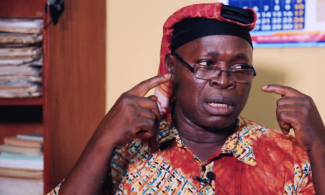
MURIC alleged that a Muslim female student of the school was asked to remove her veil by some security personnel before she could be allowed to enter the school.
An Islamic advocacy organisation, Muslim Rights Concern (MURIC), on Monday, rebuked the management of the Federal University of Agriculture in Abeokuta (FUNAAB) the Ogun state capital, for placing a ban on the use of hijab and niqab by Muslim female students on campus.
The group described the action as sentimental and against the provisions of the Constitution which accommodate the coexistence of different religions in the country.

MURIC alleged that a Muslim female student of the school was asked to remove her veil by some security personnel before she could be allowed to enter the school.
This, according to the Islamic group, was a display of hate and an effort by the institution to profile innocent Muslim female students on campus.
It, however, gave the management seven days to change its position or risk a democratic action by the Muslim students on campus.
MURIC Director, Professor Ishaq Akintola said in a statement on Monday, “No institution of learning, from primary to tertiary, whether federal, state, or even private, has the right to prohibit the use of hijab or niqab. It is a contravention of the provisions of Section 38(i) & (ii) of the 1999 Constitution of the Federal Republic of Nigeria as amended which says inter alia:
“‘Every person shall be entitled to freedom of thought, conscience and religion, including the freedom to change his religion or belief, and freedom (either alone or in community with others, and in public or in private) to manifest and propagate his religion or belief in worship, teaching, practice and observance.’
“Furthermore, Article 18 of the International Covenant on Civil and Political Right, (ICCPR) guarantees the right to freedom of religion unconditionally. In addition, Article 9 of the European Convention for the Protection of Human Rights & Fundamental Freedoms contains a right to have ‘respect for the religious feelings of believers…’ But FUNAAB authorities have no respect for the religious feelings of Muslims. This must stop!
“The problem with some non-Muslim heads of educational institutions and public offices in the South-West is that they wrongly assume that they can compel Muslims under them to abide by their own non-Muslim way of dressing. They, therefore, go all out to enact rules and regulations which disallow Muslims from dressing like Muslims. This presupposes that they hate the sight of Muslims.
“We affirm that any rules and regulations which contradict the letter and spirit of the constitution are illegal, unlawful, illegitimate and unconstitutional. This is the import of Chapter 1, Part 1, Section 1(1) & (3) of the Constitution which stipulates.
“‘This Constitution is supreme and its provisions shall have binding force on all authorities and persons throughout the Federal Republic of Nigeria.’ In particular, Section 1(3) says, ‘If any other law is inconsistent with the provisions of this Constitution, this Constitution shall prevail, and that other law shall to the extent of the inconsistency be void.’
“To that extent, therefore, all anti-niqab pronouncements, memos, circulars, posters, etc., issued by FUNAAB are null, void and of no legal effect whatsoever. The same goes for all such declarations and actions in other academic institutions throughout Yorubaland.
“We are not unaware of the security implications of the use of niqab and hijab, particularly in these days of general insecurity and we are going to be pragmatic in our approach to this danger. There is the assumption that the dresses may aid shoplifting in campus bookshops or libraries. Weapons may also be hidden under such clothing. But the same fears should also be entertained about some of our African dresses, e.g. agbada or babanriga. Or will any institution contemplate the banning of these African dresses on their campuses?
“Therefore, if the authorities are not just keen on profiling Muslims, all they need to do is to ensure that Muslim women wearing niqab or hijab are checked by female security personnel. Their identities can also be verified by female officials who will take them to one side and take a look at their faces and cross-check their identity cards.
“The security threat is not enough to deprive this insignificant number of students of their Allah-given fundamental human rights. Even the United Nations described Article 18 of the ICCPR as a provision that ‘cannot be derogated from, even in time of public emergency'.
“Hijab does not pose this kind of threat anyway. But how many female Muslim students use the niqab on campuses? They are very few, perhaps, 2, 3 or a maximum of 5 on campus. Those using niqab are very few because, unlike hijab, the niqab is not mandatory. It is a matter of choice but, at the same time, it is a symptom of a deeper spiritual journey into the labyrinth of taqwah (piety).
“Therefore, any Muslim woman who chooses to use niqab has simply elected not to ‘dress to kill’ or to show her curves just to make men salivate and run after her. Even for this reason alone, she deserves love and respect, not hate and humiliation.
“This is why we find the billboard on decent dressing erected by FUNAAB most illogical, highly irritating and extremely ridiculous. The university placed the picture of a Muslim woman in niqab among those of female students in hot pants, body hugs, male sagging trousers, crazy jeans, etc. We strongly condemn this act of provocation and we demand that the Muslim woman’s picture be removed from the billboard without delay.
“FUNAAB must also withdraw the ban placed on niqab within seven days or Muslim students in the institution will embark on peaceful demonstration as from Monday, 6 December 2021. FUNAAB is advised not to test our will or that of the Muslim students.”